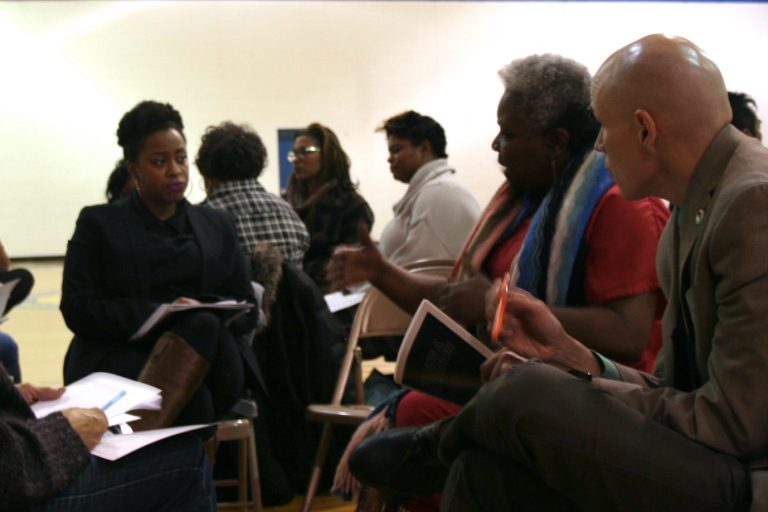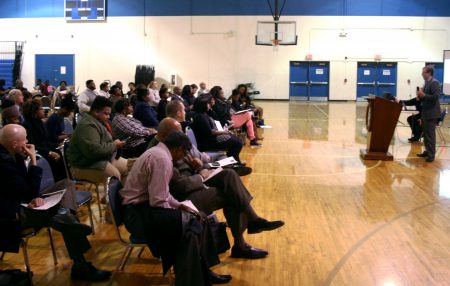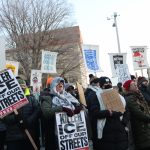A County Agenda For Black Community?
Role of Office of African American Affairs debated at listening session.
The Milwaukee County Office on African American Affairs recently held a listening session to solicit feedback from residents on a legislative agenda that it hopes will create significant, tangible change for the area’s black community. The agenda, which is focused on garnering bipartisan support, includes measures that would increase funding for workforce development programs, reform the criminal justice system and increase access to employment and work incentives.
“We are interested in productivity. We want to get stuff done, we want to put some points on the board,” said Nate Holton, chief of staff for County Executive Chris Abele. “We want to get legislation signed into law.”
The Office on African American Affairs (OAAA), which was created in November 2015 by then-county supervisor Khalif Rainey, has been mired by questions of funding, staffing and what the office would seek to achieve.
Rainey, who is now District 7 alderman, criticized what he said was a lack of action by the office in the 15 months since its creation. “In that time, we’ve seen no improvement in the joblessness … the education, and we’ve seen unrest,” he said, referring to the sometimes-violent demonstrations that swept through Sherman Park last August.
“This is the issue of our time,” Rainey said at the listening session, which was held at the COA Goldin Center, located in the 53206 ZIP code. More than 47 percent of 53206 residents, 94 percent of whom are black, live in poverty. “Considering the dire need that we have right outside this door, you know, I think it should be a priority.”
According to the 2017 adopted county budget, $267,170 has been budgeted for OAAA, after the office received no funding in 2015 and 2016. A director has yet to be hired and three of four positions within the office are still vacant. Another $300,000 has been set aside and will be approved by the county board once a director is in place— which Holton said he hopes will happen by spring —and a plan to spend the funds has been approved.
“Once we’re staffed up, that’s going to allow us to take the next step forward,” Holton said.
OAAA has outlined a strategy that utilizes community input to define issues central to Milwaukee’s black community and to influence policy and develop programs “related to the special needs of African Americans,” according to its website. The office is working on an analysis of African-American-owned businesses in the city and has held previous listening sessions focused on segregation and workforce development. It plans to continue the practice, said Abele.
The fourth and most recent session focused on how items such as increasing the Earned Income Tax Credit, doubling funding for apprenticeships, expanding expungement access and “Ban the Box” legislation would affect participants or people they know.
“What is it gonna do for me? At this point, not much,” said Brenda Hart-Richardson, 66, who is now retired and recently moved back to her family home in 53206. “But, what is it gonna do for my children, my grandchildren, my neighbors, my nieces and my nephews?”
Shanyeill McCloud, founder of Clean Slate Milwaukee, an organization that works with individuals to expunge their records, said a prior conviction can affect a person’s ability to get a job, find housing and pursue educational opportunities. In Milwaukee County more than half of African American men in their 30s have served time in state prison.
“What are we gaining by holding those people back?” McCloud asked.
To that end, OAAA is working with a local black-owned company to scrape data from the Wisconsin Circuit Court Access Portal (CCAP) to be able to better show how prior convictions are affecting the community as a whole.
Republicans hold majorities in both houses of the state legislature, and almost a two-thirds majority in the assembly, which has caused OAAA to focus its agenda on measures it expects will garner support from Democrats and Republicans. McCloud said she has had a handful of one-on-one conversations with Republican legislators regarding the expungement bill and, so far, has received a positive response.
“The legislature is what it is right now,” said Holton, a Democrat. “Either we can stand up and work with them and try to get some stuff done, and move the ball a little bit, or we can just bail and not get anything done, and yell and scream about it, and allow all of our issues to persist.”
Still, some attendees said there are deeper issues that need to be addressed. Terra McKinney, who has lived in Milwaukee since 1996, pointed to a “racial divide” that often doesn’t allow for good-faith dialogue. “You know, you can read the word ‘collaboration’ on a piece of paper but, unless [there are] two sets of rational people there to actually want to get to some sort of a solution, it doesn’t really make sense,” McKinney said.
She added, “How would it hurt the system, or how would it hurt the state, or the city, or the county, if we were to put these [legislative measures] in place?”
Hart-Richardson agreed. “Any time you have a situation like you have in 53206, it’s not by accident, it’s by design,” she said. “The way out is to have a true conversation and get about trying to restore some of it. We’re hurting people. What example, right now, are we showing?”
Holton encouraged attendees to contact their representatives and share their stories about how this legislation may affect them, their friends or family. He added that those type of stories often help to pass laws. “We need to hear them, and we need to make sure that the legislator hears them.”
“We’re always stronger together, and we can accomplish more if we work together,” Holton said. “If we stay in silos we’re not going to get very far.”
This story was originally published by Milwaukee Neighborhood News Service, where you can find other stories reporting on fifteen city neighborhoods in Milwaukee.
























In August 2016, Todd Elliott Koger submitted “a plan to target the black vote and foundation of the Democratic Party’s “voter’s turnout model” to change the destructive conversation that the “verbal fight” Mr. Trump was having with Khizr Khan, a slain U.S. soldier’s father had caused. President Trump’s verbatim use of Mr. Koger’s words in “online video” and speeches that followed in Michigan, Milwaukee (Wisconsin) and Pennsylvania changed the course of his campaign and put it on track for victory.
But also . . . In Oct. 2016 when the Trump campaign was on “life support” as a result of the “open mic incident” and everyone had abandoned Mr. Trump . . . When the media started writing the Trump campaign’s eulogy, Todd Elliott Koger drafted a new writing. A “job-driven” proposal for ending the black homicide epidemic in American Cities and submitted it as a “Treaty with Black America.” Mr. Koger advised the campaign that a “new” writing was needed to change the conversation again. Mr. Koger suggested that the campaign repackage the information, but get it out immediately.
The Trump campaign it appears did renamed Mr. Koger’s “new” writing and repackaged it to now target the poor white voters of Appalachia (“Contract with the America’s Voter”) and America’s inner cities (“New Deal for Black America”).
What Mr. Koger proposed in that October 2016 writing was a legitimate proposal with provision for intensive, wrap around holistic case management, high level occupational training, and a clear path to employment. With outreach systems, processes, and local partners Mr. Koger proposal was a needed answer for black neighborhoods. The objective of Mr. Koger’s proposal: To demolish inner city blight and rebuild America’s black neighborhoods one street at a time, using the labor of neighborhood boys and girls. The Chicago Tribune, CNN, New York Times, Washington Post and others have a copy of Mr. Koger’s proposal but haven’t written anything about it. WHY?
Black neighborhoods continued to be plagued with gun violence, black homicide, and decay, often exemplified with streets of run-down and abandoned housing. Creation of affordable housing represents a major step toward a stable society. Mr. Koger’s proposal to Mr. Trump would empower America’s inner city residents with job readiness skills and a plan for their future. It will teach good character and citizenship, and how to live healthy new lifestyles. Mr. Koger’s proposal is a realistic plan to serve the hard to reach and marginalized that society has identified as in need of quality, affordable opportunities. SOMETHING THE MEDIA WON’T TALK ABOUT?
What Mr. Koger asked President Trump to do is redevelop America’s black neighborhoods by making capital investment in “new” housing. He proposed comprehensive intervention services to encourage troubled black youth to learn and have fun in a safe, positive environment where they can gain basic education competencies, develop jobs skills, and build positive relationships. The proposal even included provision for critical one-on-one attention for struggling black youth to reduce the frequency and severity of neighborhood youth involvement in the justice system and improve long-term life options. HOW COME MR. KOGER’S PROPOSAL FOR BLACK AMERICA AND ITS INVOLVEMENT WITH THE TRUMP CAMPAIGN ISN’T NEWS?
For black boys and girls to contribute to the nurturing of their neighborhoods the facets of job training and economic development pedagogy must allow the locus of power and control of the program to remain in the hands of the local residents. Programs that come together through a neighborhood’s own initiative are organic and have the capacity to make change. Macro theories in the fields of political-economics and comparative education, accentuates the underpinnings supporting this “capability approach” to ending gun violence. AND, THIS IS THE REASON NO ONE WILL TALK ABOUT MR. KOGER’S PROPOSAL. THOSE OF US WHO LIVE IN THE INNER CITY ARE TAKEN FOR GRANTED.
In conclusion, Todd Elliott Koger’s “Treaty with Black America” in its original draft is a proposal to help black boys and girls better understand their “capability to do things.” Rebuilding their own neighborhoods and the houses they “should own and live in” will help them understand their worth and value. How black youth believe they are viewed (as clients, participants, or “the agents of change”) determines the success of their efforts. Creating a “commonality interest” and ensuring a “living wage” to sustain their families, is proposed “TO LOWER THE BODY COUNT” (PASTOR DARRELL SCOTT)!!!
Please note. According to published reports President Donald Trump’s National Diversity Coalition, led by white attorney Michael Cohen and Pastor Darrell Scott hosted the Amer-I-Can Inauguration Party at the offices of a K-Street law firm. 35 people paid $2,500 and approximately another 150 paid $1,000 to attend. Attorney Cohen and Pastor Scott pledged National Diversity Coalition financial support for legendary athlete Jim Brown’s Amer-I-Can foundation. The most recent available nonprofit tax form (2014 records) for Amer-I-Can demonstrates expenditures of $271,553, including $138,634 in salaries and $129,332 in expenses. However, Jim Brown and his wife are said to be the only listed employees. Michael Cohen, Trump’s personal lawyer outlined President Trump’s plan to curb violence and empower black communities. According to Cohen, President Trump intends to support mentoring and promote self-determination primarily through Brown’s Amer-I-Can foundation. Cohen also would not say how much money the Trump administration intends to put into the Amer-I-Can foundation, though he promised the nonprofit would see some investment.
Also be advised, in his Twitter profile Scott referred to himself as Dr. Darrell Scott. President Donald Trump has also referred to Scott as “Dr. Darrell Scott.” In his church bio Scott’s says: “Already a 21st Century Theologian and Scholar in his own right, Dr. Darrell went on to receive his Doctorate of Divinity in November of 2004.” That is, his bio is worded in a way that creates the impression that he earned the degree. To use the title “Dr.” is inappropriate and misleading since the degree was not earned. Compounding the problem is the questionable status of the college. St. Thomas Christian University is not accredited by any Department of Education or Council for Higher Education Accreditation recognized accrediting body. St. Thomas is currently unlicensed in the state of Florida. Mr. Scott appears to be using his degree from an unaccredited school to create an impression that he earned a doctorate.